Edie Melson's Blog, page 48
June 23, 2024
Writing Ideas are Like Seeds, Learn to Cultivate a Healthy Harvest

by Edie Melson @EdieMelson
I planted the seed. Apollos watered it. But God made it grow. I Corinthians 3:6
I’ve talked with a lot of writers through the years. One recurring question I get is about where they should focus their efforts. They struggle with whether to submit this article, write this devotion, try authoring a book. I encourage them to try it all.
My answer generally catches them by surprise.
I take a different approach when it comes to the decision of what to write about. I approach it like a farmer sowing seeds. I’ve never seen a gardener pull out a handful of seeds, search through them and choose only one or two to plant.
What I’ve seen is gardeners sowing many seeds—and many different kinds of seeds—at one time. Successful gardeners are orderly in their seed casting, but for their harvest to worth their time, they plant more than one thing and more than one seed. They do this knowing that not all seeds take root and grow. As writers, we would do well to follow this model.
I’m not advocating that writers start a dozen different things without finishing any. I’m not even suggesting that a writer certain of where she’s called, move too far away from that. But I am telling you that although we make plans—in obedience—God decides what grows. And it only makes sense to walk through the doors that seem to have been opened.
So take a chance, toss those seeds out. You may be surprised by what takes root and grows into a harvest.
TWEETABLEWriting Ideas are Like Seeds, Learn to Cultivate a Healthy Harvest @EdieMelson (Click to Tweet)
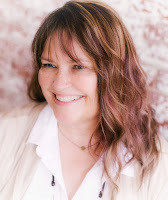 Edie Melson is a woman of faith with ink-stained fingers observing life through the lens of her camera. No matter whether she’s talking to writers, entrepreneurs, or readers, her first advice is always “Find your voice, live your story.” As an author, blogger, and speaker she’s encouraged and challenged audiences across the country and around the world. Her numerous books reflect her passion to help others develop the strength of their God-given gifts and apply them to their lives. Connect with her on her website, through Facebook, Twitter and on Instagram.
Edie Melson is a woman of faith with ink-stained fingers observing life through the lens of her camera. No matter whether she’s talking to writers, entrepreneurs, or readers, her first advice is always “Find your voice, live your story.” As an author, blogger, and speaker she’s encouraged and challenged audiences across the country and around the world. Her numerous books reflect her passion to help others develop the strength of their God-given gifts and apply them to their lives. Connect with her on her website, through Facebook, Twitter and on Instagram.June 21, 2024
Unlocking the Secret of How to Write Great Set-ups and Pay-offs

by Zena Dell Lowe @ZenaDellLowe
Writing a compelling story often hinges on one critical element: the effective use of set-ups and pay-offs. This principle is a cornerstone of storytelling that can transform a good story into a great one. The challenge, however, is that modern audiences are incredibly savvy. They can spot a set-up from a mile away, and once they do, they file it away, waiting for the moment it will reappear. This anticipation can undermine the impact of your story. So, how do you create a set-up that the audience doesn’t see coming? How can you master set-ups and pay-offs in a way that allows you to surprise and delight your audience?
Remove the Expectation of a Payoff
As a writer, I’ve had my fair share of "aha" moments, but one of the most significant pertains to this very topic. In fact, it’s one of the best techniques I’ve ever learned when it comes to creating invisible set-ups that pay off in spectacular ways. Again, the problem is that most readers are so savvy that they know when something is a set-up, which means they’re already filing it away for later, expecting it to come into play. But what if you had a way to remove that expectation? What if the reader WASN’T waiting for that payoff to come into play, because in their minds, that set-up has already served a purpose? This is precisely the shift you have to make.
The key is to make the set-up accomplish something emotionally significant at the moment it’s introduced in the story.
For instance, imagine your character carries a lucky coin around that will ultimately be used in the story's climax to play a love song on a jukebox, convincing the girl to stay. You need to establish that the character has this lucky coin, but you don't want the reader to anticipate its significance too early. So, how do you achieve this? You make the coin accomplish something emotionally significant for the character at the moment it’s introduced.
Picture this: your character nervously rolls the coin back and forth across his knuckles. It’s a habitual gesture, done absentmindedly. Suddenly, the girl notices. She smiles, clearly impressed by his dexterity. This small interaction gives your character a boost of confidence and inspiration, motivating him to overcome his fears and pursue her.
By doing this, the lucky coin has already played an important role in the character’s emotional journey. He transitions from a state of nervousness to one of determination and self-assurance. When the audience believes the set-up has already served its purpose, they won't be anticipating its return. This sets the stage for a powerful and surprising payoff later in the story.
Let’s illustrate this with another example.
Imagine a character who needs to use their mother’s brooch to pick a lock later in the story. If you simply show the brooch’s secret compartment early on, the audience will anticipate its later use. Instead, reveal the brooch in a scene where the character uses it to achieve an immediate, emotionally resonant goal. Perhaps the brooch is used to fix a broken toy for a child, creating a touching moment. The audience sees the brooch serving its purpose in that scene and won’t be expecting it to return.
One of the Best Set-up and Pay-off Examples Ever
One of the best examples of brilliant set-ups and pay-offs is found in the film "Aliens." At the start of the movie, we see Ripley, played by Sigourney Weaver, dealing with the aftermath of her traumatic encounter with an alien. She’s been marginalized and demoted to working as a loader operator. This detail is revealed in a conversation with a company man who is trying to convince her to join a mission. The loader operation seems like a minor, almost throwaway detail used to manipulate Ripley into agreeing to the mission. It’s a set-up that immediately pays off, which is why the audience doesn’t realize its importance.
Fast forward to a scene where Ripley, feeling out of place among the tough Marines, mentions she can operate a loader. She demonstrates her skills in a detailed sequence, which accomplishes an emotional goal: earning her acceptance among the team. At this point, the loader detail has paid off twice. First, it was used to manipulate Ripley into joining this mission, and now it’s been used to help Ripley fit in. The audience feels doubly satisfied. It’s paid off in full, so we don’t expect it to come into play again. In fact, we completely forget about it.
The genius of this set-up is revealed in the climax of the film. By then, we’ve completely forgotten about the loader. When Ripley confronts the alien queen and reappears in the loader to save the day, it’s an unexpected, thrilling moment. The audience cheers because the set-up was so cleverly masked. The loader had already served an emotional purpose earlier in the story—TWICE—making its return a delightful surprise.
Good Set-ups and Pay-offs Delight and Surprise Your Readers
This example from Aliens perfectly illustrates how to create invisible set-ups that pay off in impactful ways. By making the set-up serve an immediate emotional purpose, the audience is misled into thinking its role is complete. When it returns later, the surprise is both satisfying and exhilarating.
To achieve this in your own writing, always look for ways to integrate set-ups into emotionally charged scenes. This technique not only disguises the set-up but also enriches your story by adding depth to the characters and their interactions. When the pay-off finally arrives, it feels natural and earned, making it all the more powerful.
Conclusion
Mastering the art of set-ups and pay-offs is a game-changer for any writer. By ensuring your set-ups accomplish something emotionally significant when first introduced, you can create surprises that your audience won’t see coming. This technique enhances the overall storytelling experience, making your narrative more engaging and memorable.
For more insights like this, be sure to check out The Storyteller’s Mission podcast on YouTube or on the podcast app of your choice. Also, don’t miss out on becoming a beta member of our new class, "Hollywood Story Structure Made Easy,” which is on sale for a limited time! Click here to learn more.
TWEETABLEUnlocking the Secret of How to Write Great Set-ups and Pay-offs - @ZenaDellLowe on @EdieMelson (Click to Tweet)
 Zena has worked professionally in the entertainment industry for over 20 years as a writer, producer, director, actress, and story consultant. Zena also teaches advanced classes on writing all over the country. As a writer, Zena has won numerous awards for her work. She also has several feature film projects in development through her independent production company, Mission Ranch Films. In addition to her work as a filmmaker, Zena launched The Storyteller’s Mission with Zena Dell Lowe, a podcast designed to serve the whole artist, not just focus on craft. In 2021, Zena launched The Storyteller’s Mission Online Platform, where she offers advanced classes and other key services to writers. Zena loves story and loves to support storytellers. Her passion is to equip artists of all levels to achieve excellence at their craft, so that they will truly have everything they need to change the world for the better through story.
Zena has worked professionally in the entertainment industry for over 20 years as a writer, producer, director, actress, and story consultant. Zena also teaches advanced classes on writing all over the country. As a writer, Zena has won numerous awards for her work. She also has several feature film projects in development through her independent production company, Mission Ranch Films. In addition to her work as a filmmaker, Zena launched The Storyteller’s Mission with Zena Dell Lowe, a podcast designed to serve the whole artist, not just focus on craft. In 2021, Zena launched The Storyteller’s Mission Online Platform, where she offers advanced classes and other key services to writers. Zena loves story and loves to support storytellers. Her passion is to equip artists of all levels to achieve excellence at their craft, so that they will truly have everything they need to change the world for the better through story.To find out more about Zena or her current courses and projects, check out her websites at WWW.MISSIONRANCHFILMS.COM and WWW.THESTORYTELLERSMISSION.COM
June 20, 2024
Ten Friendly Tips to Help Writers Stay on Track

by Crystal Bowman
Throughout my decades of writing, I’ve learned much from editors, mentors, writers’ conferences, and seasoned writers. I have kept a list of helpful tips that I read now and then to brush up and refresh my writing brain. No matter where we are on our writing journey, it’s always good to review best practices.
10 Dos and Don’ts for Writers1. Avoid lengthy prologues, forwards, and introductions: Readers are eager to get into the book. If these features are too long, readers (like me) will skip them.
2. Less is more: Say as much as you can with as few words as possible. Use strong verbs instead of adverbs. Rather than: She walked slowly and quietly past the baby’s room.Use: She tiptoed past the baby’s room.
3. Show don’t tell: Don’t tell me Jimmy was mad, show me. Rather than: Jimmy was mad because he thought his dad was being unfair.Use: Jimmy stomped his foot. “That’s not fair,” he said.
4. Punctuation: Avoid the overuse of exclamation points and use only one punctuation at a time!?! (One of my pet peeves!)
5. Don’t go into great detail describing characters: In the picture book, Where the Wild Things Are, Maurice Sendak begins the story this way: The night Max wore his wolf suit and made mischief of one kind and another, his mother called him “Wild Thing!” and Max said, “I’ll eat you up!” so he was sent to bed without eating anything.
That tells us what we need to know about Max without a lengthy introduction to his character.
6. Keep dialogue attribution simple: Also know as tag lines, dialogue attribution lets the reader know who’s speaking. It’s not the place for descriptive verbs, creative adverbs, or action.Rather than: “We need to leave now, or we’ll be late!” Josh hollered angrily as he looked at his watch. Use: Josh frowned as he looked at his watch. “We need to leave now, or we’ll be late,” he said. Note: When there is ongoing dialogue between two characters and it’s clear who is speaking, the tag line can be dropped.
7. You cannot laugh or sigh words:Rather than: “I wore two different shoes,” laughed Jonny.Use: Jonny laughed. “I wore two different shoes,” he said.Rather than: “I’m getting tired of this,” sighed Sarah. Use: Sarah let out a sigh. “I’m getting tired of this.” (you can skip the tag line)
8. Use specific words over generic words: Using specific nouns and verbs allows the reader to visualize the text. For example: On the fifth day, God said, “Let the waters be filled with living things.” Sharks and whales and jellyfish were soon swimming in the seas. Then God said, “Let the birds fly high in the air above the earth.” And just like that, eagles were soaring through the sky and robins were building nests in maple trees.
9. Have your work edited before you submit it to a publisher: When an editor at Zondervan was interested in my children’s stories many decades ago, he passed me off to his assistant editor to help improve my writing. Those days are gone. Hire an editor or writing coach to review, edit, and proofread your story. Your best friend, spouse, or English teacher don’t qualify unless they are published authors or professional editors.
10. Proverbs 3:5-6 (NIV): Trust in the Lord with all your heart and lean not on your own understanding; in all your ways submit to him, and he will make your paths straight.
TWEETABLETen Friendly Tips to Help Writers Stay on Track from author Crystal Bowman on @EdieMelson (Click to Tweet)
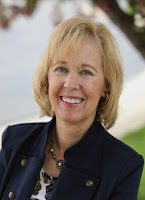 Crystal Bowman is an award-winning, bestselling author of more than 100 books for children and families. She also writes lyrics for children’s piano music and is a monthly contributor to Clubhouse Jr. Magazine, Arise Daily, and Christian Children's Authors. She enjoys coaching children's writers as well as teaching at writers conferences. When she is not writing or speaking, she likes going for walks and spending time with her huggable grandkids. She and her husband live in Michigan and Florida and try to avoid snowstorms.
Crystal Bowman is an award-winning, bestselling author of more than 100 books for children and families. She also writes lyrics for children’s piano music and is a monthly contributor to Clubhouse Jr. Magazine, Arise Daily, and Christian Children's Authors. She enjoys coaching children's writers as well as teaching at writers conferences. When she is not writing or speaking, she likes going for walks and spending time with her huggable grandkids. She and her husband live in Michigan and Florida and try to avoid snowstorms.WWW.CRYSTALBOWMAN.COMWWW.FACEBOOK.COM/CRYSTAL.BOWMANWWW.FACEBOOK.COM/CRYSTALJBOWMANWWW.INSTAGRAM.COM/CRYSTALBOWMANAUTHOR
June 19, 2024
Book Marketing Based on Your Personality

by Susan U. Neal RN, MBA, MHS @SusanNealYoga
Writing and publishing your book is just the beginning of an author’s efforts. The other half is book marketing. There are numerous ways to market your book. Choosing strategies that align with your personality can lead to outstanding results.
Marketing Based on Personality
For those who like to be in the spotlight, public speaking, radio, podcast, and TV appearances work well. So would conducting in-person book signings and events. These strategies allow you to shine in front of the audience. Whereas an introvert may be more comfortable writing a guest blog or magazine article versus speaking in front of others. These methods allow you to share your message without the pressure of public speaking. Matching your marketing approach to your personality helps you present your best self and make your marketing efforts more effective.
In addition to marketing, an author should measure the results of each marketing tactic. Usually TV provide the broadest coverage. However, in person speaking events can lead to significant book sales. With each marketing tactic track your book’s Amazon rank through the Author Central portal and determine how many book sales occurred within a few days of the event to see which strategies work best. This data-driven approach allows you to focus on the most effective marketing methods in the future. Without scientific data you randomly perform tasks without knowing which one provides the best results.
Christian Authors Network (CAN) Excellence in Marketing Awards
The CAN excellence in marketing awards provides a fantastic opportunity for authors to evaluate their marketing efforts. Sometimes we need an accountability partner to perform difficult tasks. Considering entering this award your partner. Christian authors are invited to submit their marketing endeavors annually in September via https://christianauthorsnetwork.com/marketing-award/ . Start tracking the results of your marketing now to be ready to enter the awards.
The benefits of entering these awards are significant for the winners. The top-place winner receives a $1495 publicity package from the esteemed Jones Literary agency in Nashville, Tennessee. The three first-place winners win a publicity packet including a book announcement sent to 15,000 Christian readers, 1400 Christian retailers, 400 media, and 300 book review bloggers. And they will be featured on a CAN blog tour and receive Celebrate Lit’s Social Media Building Giveaway Share Promo. Award trophies and certificates are also presented.
Christian Authors Network (CAN) celebrates the book marketing ingenuity of the winners of the 2024 CAN Excellence in Marketing Awards.
Christian Authors Network 2024 Excellence in Marketing Award Winners
Category
Place
Book or Ministry Title
Author
NONFICTION
Broadcast Media
1st
GodPrints: Finding Evidence of God in the Shattered Pieces of Life
Jenny Leavitt
Broadcast Media
2nd
Launch of third Book in Unseen Series, Nobody Sees This Creation
Paul Renfroe
Broadcast Media
3rd
Bridge of Love: 30 True Stories of Faith in Action, Marketing Plan Book #1
Pamela Walck
FICTION
Broadcast Media
1st
Michele Chynoweth
Broadcast Media
2nd
Nuggets For Thought A Mother and Daughter's Collection of Poems, Reflections and Flash Fiction About the Life They See
Lyvita Brooks
NONFICTION
Web Presence
1st
Dear Food, I Love You. I Hate You. Don't Leave Me!
Julia Fikse
Web Presence
2nd
Nobody's Mother: Artemis of the Ephesians in Antiquity and the New Testament
Sandra Glahn
Web Presence
3rd (tied)
Mimika Cooney
Web Presence
3rd (tied)
Praying Personalities: Finding Your Natural Prayer Style
Janet McHenry
FICTION
Web Presence
1st
Karen Brough
NONFICTION
Physical Media
1st
Cecil Taylor
Physical Media
2nd
Art for the Soul: Growing Your Faith Through Creativity
Kelly Brinkmann
FICTION
Physical Media
1st
Shine On Musical Storytime - "Be Still ~ A Mother's Lullaby"
Karla Bauer
Purposeful in its mission, the CAN Excellence in Marketing Awards aims to spotlight and inspire exceptional marketing efforts among Christian authors. In the realm of Christian publishing, excellence in marketing achieves greater visibility and impact on furthering the kingdom of God.
TWEETABLEBook Marketing Based on Your Personality from @SusanNealYoga on @EdieMelson (Click to Tweet)
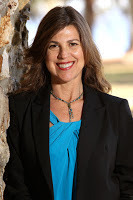 Susan U. Neal, RN, MBA, MHS: Susan’s mission is to improve the health of the body of Christ. She has her RN and MBA degrees, as well as a master’s in health science. She is a CERTIFIED HEALTH AND WELLNESS COACHwith the American Association of Christian Counselors. She published five books, the Selah award winner 7 STEPS TO GET OFF SUGAR AND CARBOHYDRATES, CHRISTIAN STUDY GUIDE FOR 7 STEPS TO GET OFF SUGAR AND CARBOHYDRATES, HEALTHY LIVING JOURNAL, SCRIPTURE YOGAa #1 Amazon best-selling yoga book, and YOGA FOR BEGINNERSwhich ranked #3. She published two sets of Christian Yoga Card Decks and two Christian Yoga DVDs that are available at CHRISTINAYOGA.COM. Her digital product HOW TO PREVENT, IMPROVE, AND REVERSE ALZHEIMER’S AND DEMENTIA is a great resource. To learn more about Susan visit her website SUSANUNEAL.COM You can also connect with Susan on FACEBOOK, TWITTER, and INSTAGRAM.
Susan U. Neal, RN, MBA, MHS: Susan’s mission is to improve the health of the body of Christ. She has her RN and MBA degrees, as well as a master’s in health science. She is a CERTIFIED HEALTH AND WELLNESS COACHwith the American Association of Christian Counselors. She published five books, the Selah award winner 7 STEPS TO GET OFF SUGAR AND CARBOHYDRATES, CHRISTIAN STUDY GUIDE FOR 7 STEPS TO GET OFF SUGAR AND CARBOHYDRATES, HEALTHY LIVING JOURNAL, SCRIPTURE YOGAa #1 Amazon best-selling yoga book, and YOGA FOR BEGINNERSwhich ranked #3. She published two sets of Christian Yoga Card Decks and two Christian Yoga DVDs that are available at CHRISTINAYOGA.COM. Her digital product HOW TO PREVENT, IMPROVE, AND REVERSE ALZHEIMER’S AND DEMENTIA is a great resource. To learn more about Susan visit her website SUSANUNEAL.COM You can also connect with Susan on FACEBOOK, TWITTER, and INSTAGRAM.
June 18, 2024
Develop Intentional Consistency to Become the Writer You Want to Be

by Edie Melson @EdieMelson
The idea of INTENTIONAL CONSISTENCY may seem too obvious to merit mention, but I would beg you to stick with me. Life these days is incredibly busy. We’re subdividing our time into smaller and smaller portions, leaving us with just more details to keep track of.
Writing can easily fall between the cracks.
But I would propose that worked-in-between-the-insanity isn’t where our writing belongs. We have been given a gift and entrusted with a calling. I’ve come to believe it’s poor stewardship on my part to ignore that. So I’ve decided to begin the practice of writing with intentional consistency.
But all around me, no matter my good intentions, life continues to loom and intrude.
8 Things to Help Writers Practice Intentional Consistency
1. I’ve determined my most creative hours of the day and blocked them off on my calendar. For me it’s the morning—anytime before noon. Truthfully, I’m not able to spend every single morning writing, but with the time blocked off, it makes me weigh other opportunities differently.
2. I set weekly goals. I prefer weekly over daily goals because they’re easier to meet. If I miss a day for some reason, I still have the rest of the week to meet the expectations I’ve set. Sometimes I structure my goals around word count, but not always. Right now I’m working on a series of devotions, so I have a set number I want to finish editing each week.
3. I write regularly. No, I don’t always write something every day. I believe writers should have a Sabbath rest. But I write when I don’t feel like it, as well as when I feel like it. Hear my heart on this. We are all busy. We all have important things that need doing. But if we’re going to call ourselves writers then writing MUST be one of those things. We can’t just talk about writing, critique other writers, or plan to write when life slows down. If we choose that attitude then we’re no better than the rich man in Luke 12 who was planning to build bigger barns. We are not promised tomorrow and we’ve got to quit squandering today.
4. I respect my calling. This is an attitude change for me. Through prayer and study, I’ve determined that God expects me to be obedient. I know, not a huge revelation, but just wait. That obedience isn’t supposed to only be in regard to the hard or the difficult things in my life. Obedience is foundational to everything. You see, I love writing and because it’s fun, I had developed the idea that it wasn’t important. And by the way, this has nothing to do with whether or not I'm making money with my writing. It has to do with obedience only.
5. I’m willing to let God set my priorities, even when it means saying no. I’m doing my best to model my life on Jesus. As I’ve studied His life, I’ve realized that He was not constrained by someone else’s agenda—even when it was urgent. He walked away from crowds who needed healing, those who were hurting, even disciples who were confused. Only God set His priorities. Everywhere around us are ministries that need workers, children who need babysitting, and loved ones who need help. I am not God. I cannot be everywhere at once. God is the only one who can make sense of all the needs surrounding me. When He says no, I go with it. When He says write, I sit down and write.
6. I’ve enlisted a team. Actually, I have a couple of them. I have a prayer team who pray specifically for me and my writing ministry. I also have a group of writers that I meet with regularly. Both groups hold me accountable and help me remember my priorities. They also give me the perspective I need to make wise choices.
7. I now take time off. I’ve tried to work every waking hour I can, and it just doesn’t work. I’m not capable of sustaining that time of schedule. It makes me cranky, tired, and generally difficult to live with. It’s also NOT fair to my family and friends. Relationships do matter. When my life is out of balance, my calling isn’t the only thing that suffers.
8. I nurture my relationship with God. This is foundational and without it, numbers 1 through 7 are meaningless. I make regular times of prayer and study a priority. I’ve discovered—the hard way—that the crazier life gets, the more time I need with God.
None of these eight things is earth shattering, in fact they’re fairly obvious unless we’re applying them to ourselves. For me though, they required a dramatic shift in thinking and acting. I’d love for you to share your thoughts on intentional consistency in your writing life. Be sure to share your comments in the section below.
Don’t forget to join the conversation!Blessings,Edie
TWEETABLEDevelop Intentional Consistency to Become the Writer You Want to Be from @EdieMelson (Click to Tweet)
 Edie Melson is a woman of faith with ink-stained fingers observing life through the lens of her camera. No matter whether she’s talking to writers, entrepreneurs, or readers, her first advice is always “Find your voice, live your story.” As an author, blogger, and speaker she’s encouraged and challenged audiences across the country and around the world. Her numerous books reflect her passion to help others develop the strength of their God-given gifts and apply them to their lives. Connect with her on her website, through Facebook, Twitter and on Instagram.
Edie Melson is a woman of faith with ink-stained fingers observing life through the lens of her camera. No matter whether she’s talking to writers, entrepreneurs, or readers, her first advice is always “Find your voice, live your story.” As an author, blogger, and speaker she’s encouraged and challenged audiences across the country and around the world. Her numerous books reflect her passion to help others develop the strength of their God-given gifts and apply them to their lives. Connect with her on her website, through Facebook, Twitter and on Instagram.
June 17, 2024
What Editors Wished Writers Knew

by Katherine Hutchinson-Hayes @KHutch0767
I’ve always thought of myself as a writer first and then an editor. There are distinct differences between the two roles. Throughout my experience as an editor, I’ve encountered a few scenarios that can sometimes lead to misunderstandings between writers and editors. This is regrettable because our objectives are often aligned—to produce a well-written project, publish it, and potentially receive recognition. The cherry on top or goal would be to have all these things and get paid.
Most editors wish that writers knew and fully grasped the following.
Ethics CountAn editor demonstrates sound ethics if they think a project isn’t ready for proofreading or copyediting, notify the author, and recommend either developmental editing or improving the author’s writing skills. Other ethical dilemmas may arise, particularly when working with self-published material. Editors aren’t required to edit work that goes against their morals and religious beliefs. At times, editors may need to guide an author who hasn’t adequately fact-checked or conducted proper research relevant to certain types of literature.
Near-perfection NeededThe term “downsizing” is frequently utilized in the publishing sector, especially in publishing companies where many have reduced their workforce and brought in freelancers. Publishers, as businesses, seek the most effective methods to broaden their profit margins. Authors are expected to engage an external editor to ensure their manuscript is nearly flawless before submitting it. This also applies to agents who receive numerous inquiries, proposals, and manuscripts. If an author's work still requires professional editing, a literary agent will probably decline it.
Editors Are DifferentEditors have unique styles that distinguish them, much like individuals with different personalities. These distinctions are evident in their preferred manner of communication, the variety of services they provide, and their preferred working methods.
Good Editing Takes TimeWhen establishing their publishing timetables, writers should ensure they allocate twice as much time as they originally expected for revisions. Editing frequently encompasses more than simply correcting a few grammar mistakes. When conducted appropriately, the editing process is prolonged and laborious.
Good Editing Costs BUT PaysEditing can sometimes be expensive, ranging from hundreds to thousands of dollars, depending on the piece’s length. Nevertheless, editors invest numerous hours in reading manuscripts and providing suggestions, corrections, and feedback. They put great effort into ensuring a book is in its finest form. Hiring an editor has a notable payoff because they significantly improve the likelihood of being represented by an agent, getting published, and achieving success in the literary world.
Editing Services VaryWhen hiring an editor, there are various editing services to choose from. These typically include developmental editing, copyediting, and proofreading. Developmental editing addresses plot holes and character development, while copyediting deals with sentence structure and diction. Proofreading is strictly about checking for typos and basic grammatical errors. Providing specific details about your manuscript's needs helps the editor understand the direction to take and whether the project aligns with their expertise. Most editors specialize in specific types of editing rather than offering all services.
Bottom LineThe professionals who edit our writing aren’t resentful people trying to control our access to publication. It’s quite the opposite. An editor’s primary goal is to assist writers in gaining entry into the world of published works. When they make comments, corrections, and suggestions, they’re working toward the author's best interests. The fact that a manuscript needs revisions and enhancements doesn’t imply that the editor dislikes the writer or their work. Quite often, editors relish seeing their clients obtain literary representation, get published, receive awards, and get paid.
Editors are supportive partners to writers in a competitive publishing industry. They’re essential for refining and improving an author’s work. Their skills lie in giving valuable feedback, fixing grammar and punctuation, proposing structural adjustments, and guaranteeing effective communication of the overall message. They can be one of the writer’s most important allies. Ultimately, an editor’s input helps writers improve their skills and produce higher-quality content for literary success.
TWEETABLEWhat Editors Wished Writers Knew from @KHutch0767 on @EdieMelson (Click to Tweet)
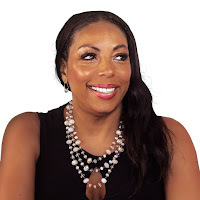 Dr. Katherine Hutchinson-Hayes is a review board member and contributor to Inkspirations (an online magazine for Christian writers), and her writing has been published in Guideposts. Her work in art/writing is distinguished by awards, including the New York Mayor’s Contribution to the Arts, Outstanding Resident Artist of Arizona, and the Foundations Awards at the Blue Ridge Mountains Christian Writer’s Conference (2016, 2019, 2021). She is a member of Word Weavers International and serves as an online chapter president and mentor. She belongs to FWA (Florida Writers Association), ACFW (American Christian Fiction Writers), CWoC (Crime Writers of Color),
Dr. Katherine Hutchinson-Hayes is a review board member and contributor to Inkspirations (an online magazine for Christian writers), and her writing has been published in Guideposts. Her work in art/writing is distinguished by awards, including the New York Mayor’s Contribution to the Arts, Outstanding Resident Artist of Arizona, and the Foundations Awards at the Blue Ridge Mountains Christian Writer’s Conference (2016, 2019, 2021). She is a member of Word Weavers International and serves as an online chapter president and mentor. She belongs to FWA (Florida Writers Association), ACFW (American Christian Fiction Writers), CWoC (Crime Writers of Color),AWSA (Advanced Writers and Speakers Association), and AASA (American Association of School Administrators). She serves on the nonprofit organization Submersion 14 board and the 540 Writer’s Community board and is an art instructor for the nonprofit organization Light for the Future. Katherine hosts the podcast Murder, Mystery & Mayhem Laced with Morality. She has authored a Christian Bible study for women and is currently working on the sequel to her first general market thriller novel. Her thriller A Fifth of the Story will debut in February 2024 through Endgame Press.
Katherine flourishes in developmental editing and coaching writers. She has a twenty-year career in education, leadership, and journalism. Katherine freelances as an educational consultant for charter schools, home school programs, and churches. In this role, she has written and edited curriculum, led program development, and helped manage growth facilitating and public relations.
She also works as an editor and book coach through her consulting business. Katherine provides skill, accountability, and professionalism so clients can begin, develop, and finish their writing projects for publication.
June 16, 2024
How Authors Can Extend Their Reach for More Marketing
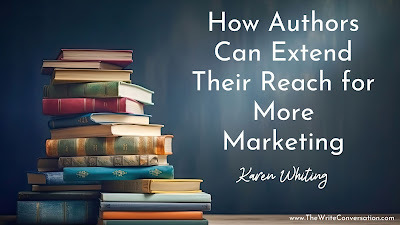
by Karen Whiting @KarenHWhiting
Writing brings intrinsic and extrinsic benefits. Internally we increase our empathy as we write stories whether true or fiction, we increase our creativity, and learn to harness and organize our thoughts. Externally we develop friendships, extend our reach from people we know to readers who can be anywhere in the world. We develop stronger communication skills to better share our thoughts and impart wisdom, joy, and biblical insights to others. External benefits over which we have no control bless us such as trips to speak, getting to know famous people, and opportunities to share what God puts on our hearts.
These benefits often lead to marketing opportunities. I was recently chosen by the Ministry of Tourism of Israel to be one of four journalists who will soon go on a trip to Israel. Free trips are great, but this came because of developing relationships in the industry. I had to show that I had commitments to write for one or more publications with audiences of 50k of more. I quickly had commitments for several articles (I wanted to be on the top of the applicants). This will add to the depth of a book on archeology I contracted with Tyndale Kids. And today I mentioned the trip on an interview, where my bio included the 2026 release. The host asked me to return to discuss biblical archeology.
Extend Your ReachCritique GroupsThe people in your critique groups become cheerleaders and support you. They may be tough at times to make you a better writer, but that helps you. They can often become part of your launch team and give you leads for where to submit your work. Some of my first strong writing friends came from my critique groups. They still mean so much to me although several have moved on to heaven.FriendshipsWe make friends all the time through writing with other writers as well as readers, editors, media people, and professionals in publishing. It's amazing how the connections can open doors. In February a friend mentioned a mom organization she joined where she is now a mentor mom. I contacted them and I'm a trainer mom for them. While at the organization's conference recently I spoke with so many wonderful women and made connections I'll build. Some have podcasts and want me on. For others, I am connecting them to media hosts and other possibilities. This story is one of hundreds I could share.
Through friends who connected me with editors, media hosts, and magazine editors I have received book contracts opportunities to write articles, and interviews. These types of opportunities never stop. And I never stop sharing connections.ArticlesOnce you have an article published, email your appreciation to the editor with a comment about something you liked, such as the layout, placement, an editorial tweak, or simply your pleasure at seeing it in their magazine (and why you wanted to be in it. Then, pitch a few new ideas you could write. This simple step develops the relationship and opens the door for future opportunities.
I wrote an article last year for an editor I was not sure I could please but he thanked me and asked me to let him know if I had other ideas that could fit. A few months later I pitched something else. A few months after that he came back and asked for something related to my pitch but not exactly the pitch and I am writing it now. Recently we chatted and got to know one another better.Publicists and Others in the IndustryA publicist my publisher hired became a friend and helped me in many ways to understand how to connect and get booked. I hired him a few times also for special events and when I did not have time to pitch myself. He opened doors to getting on TV shows.
My agent and the agency made great connections for me and introduced me to their clients. Some of the clients were huge names that I never expected to meet. Others became comrades who journeyed beside me as we continued writing. They also added to my contacts and grew my network.
Even photographers, copyeditors, and others have share knowledge and even connections. A new friend who is a photographer taught me a lot about thinking of the possible images as I write a story and how to capture a shot if I need to be the photographer. This new friend sent me an email even as I started writing this post. I am connecting him to be at a conference later this year.Readers Readers are your grassroots followers who can share with other readers. Be good to them! Bless them with special news first, respond when they post, and pray for them.Making the Most of Your ReachTo make the most of your connections, pray for them, be sure to show appreciation, exchange books at times, send thanks, follow them on social media, and stay in touch. Share your connections that can help them and be thankful when they share connections. If they are on media, listen in, post a comment, and later ask if they will share their connection if it might be a good fit.
Every person we meet is someone important to God and many may become part of our network. Take time to listen and get to know people you encounter.
TWEETABLEHow Authors Can Extend Their Reach for More Marketing from @KarenHWhiting on @EdieMelson (Click to Tweet)
 Karen Whiting (WWW.KARENWHITING.COM) is an international speaker, former television host of Puppets on Parade, certified writing and marketing coach, and award-winning author of twenty-seven books for women, children, and families. Her newest book, The Gift of Bread: Recipes for the Heart and the Table reflects her passion for bread and growing up helping at her grandparent’s restaurant. Check out her newest book Growing a Mother’s Heart: Devotions of Faith, Hope, and Love from Mothers Past, Present, and Future. It's full of heartwarming and teary-eyed stories of moms.
Karen Whiting (WWW.KARENWHITING.COM) is an international speaker, former television host of Puppets on Parade, certified writing and marketing coach, and award-winning author of twenty-seven books for women, children, and families. Her newest book, The Gift of Bread: Recipes for the Heart and the Table reflects her passion for bread and growing up helping at her grandparent’s restaurant. Check out her newest book Growing a Mother’s Heart: Devotions of Faith, Hope, and Love from Mothers Past, Present, and Future. It's full of heartwarming and teary-eyed stories of moms.Karen has a heart to grow tomorrow’s wholesome families today. She has written more than eight hundred articles for more than sixty publications and loves to let creativity splash over the pages of what she writes. She writes for Crosswalk. Connect with Karen on Twitter @KarenHWhiting Pinterest KarenWhiting FB KarenHWhiting.
June 15, 2024
A Writer’s Dilemma

by Tammy Karasek @TickledPinkTam
We’re halfway through the year, and halfway through the various Christian writing conferences in the United States. There are so many to choose from. Whether you’re looking to pitch your book you’ve finished, or need to study a writing topic you aren’t strong in, or you need to pursue another aspect to your writing, such as speaking, you need to find a good conference fit. You may want to attend to meet other writers that are into this whole writing thing that non-writers call weird—writers get writers, that’s for sure.
I, too, have attended a couple Christian writing conferences so far this year. I’ve had the privilege to be on faculty at them. As a brand-new conferee a few years ago myself, now I have the joy of talking with first-time attenders and I try my best to encourage and help them become excited for this path they feel called to follow.
Now home a couple of weeks after teaching at the Blue Ridge Mountains Christian Writers Conference, I’ve seen post after post sharing of the mountain-top experience so many writers had. Reading the comments has made me smile and even giggle at some of their thoughts. I’ve enjoyed them and also thanked God for the goodness he brought to them.
On the other hand, for those I’ve read about with a great week, there are a lot more that have not shared publicly about their time at a conference. They may not have had that mountain-top experience and may describe it as a time in a valley. I’ve talked to a few before I left the recent conference who were very discouraged. Maybe you, too, have felt discouraged when you’ve left a conference. I couldn’t help wonder if we have too many pre-conceived notions of what a conference should be for us.
One of the folks I spoke with I believe she had put a high expectation on this conference to go a certain way for her. She expected each of the faculty she spoke with to be as enthused as she was about her book she’d written. She expected to have been asked for a proposal from each of them so she could decide the best offer. None even asked for a one-sheet.
Another person thought she’d find a critique partner and a big circle of new writing friends. When she shared this, I asked if she’d been out in the spots where the conferees hung out. This particular conference has many places that you’ll see writers sitting in rockers, sharing a laugh over a cup of coffee, hanging out in the lobby every evening and seeking out a meal-time table that is full of conversation and smiles. She said she’d stayed in her room.
In my family, I’m known as the “why” girl, so in each of these situations I dug further into what they were saying and thinking. When I dug further for the writer expecting representation before she left, I explained to her obtaining representation at the conference is rare. Not a never situation, only a rare one. When she said she was upset that none of the faculty she spoke to about her book were excited about it, I asked if she had read through their bios to see if that was something they were looking for. She said no. I grabbed my phone looked up the person and then showed her that person doesn’t represent that specific thing, therefore that could be the reason they weren’t as excited about it as she thought they should be.
For the lady who didn’t find her critique partner and a bunch of new writerly friends, my “why” girl brain showed up again. Without being rude, I asked if she reached out to others. Her answer almost made me laugh, but I refrained. “Of course I didn’t, I’m new here.” I asked if she realized at this particular conference, it was close to 50% or more that were brand new like her. She said she didn’t realize that.
Thus, a dilemma I hear about more and more. Should I go to a writing conference, they never give me what I want.
Ah, what you want. But what about what you need?
With more conferences left for the current year, I thought I’d offer some advice for those of you heading off to one. ()Drop the high expectations. Let God lead the path for the week. There are more great stories of those conferees that showed up with open hands, open ears, and open minds that came away in awe of what God did for them that week. Remember these are your people. They say we writers are an odd lot, so look at it this way – all these writers around you get it, get you. They know many writers are introverts like them and one of you must start a conversation. Let it be you. Do look over the faculty and what they will teach to semi-plan your time there. Check out the publishers, agents, and acquisition editors to see what they are looking for at this time and what they will represent. Just because YOU want to be represented by Mr./Mrs. Specific Agent or think you will only let ABC Publisher sign a contract for your book, be open to what else is there. Be willing to change your schedule should something be presented you weren’t expecting. A better opportunity could be there but you refused to have an open mind. Open it, friend.Don’t hide away in your room. Those conversations with other writers won’t happen there. Also, God may have planned a thirty-minute or more conversation at a table in the coffee shop you would have never been able to schedule on your own. And it could be an excellent agent who wasn’t even on your radar that adores your story and wants more info. Staying out and about the conference leaves more possibilities for those God-incidences that make you say WOW.
As a writer going to a writing conference, you may have one of these dilemmas. Do you come out of your comfort zone if you’re an introvert and take advantage of opportunities to meet other writers who could eventually become your critique or craft partner? Or do you arrive at the conference with high expectations and a check list of what you expect the faculty and/or conference to give to you?
My suggestions to you are: 1) to forget that you’re an introvert. If you would like to find more writer friends, make yourself available for others to meet you. You never know who’s looking for the same unless you communicate. Hey—you’re a writer, writers’ love words, use them! 2) And for some of you that have an arm’s length of wants, leave those high expectations at home. I’m not saying you should have no expectations, but don’t set a bar so high that it’s going to be impossible to attain.
TWEETABLEA Writer's Dilemma from @TickledPinkTam on @EdieMelson (Click to Tweet)
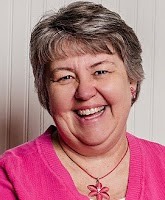 Tammy Karasek uses humor and wit to bring joy and hope to every aspect in life. Her past, filled with bullying and criticism from family, drives her passion to encourage and inspire others and give them The Reason to smile. She’s gone from down and defeated to living a “Tickled Pink” life as she believes there’s always a giggle wanting to come out! A writer of Romance—with a splash of sass. She’s also The Launch Team Geek helping authors launch their books and also a Virtual Assistant for several best-selling authors. Don't miss her recent book, LAUNCH THAT BOOK, just released in November.
Tammy Karasek uses humor and wit to bring joy and hope to every aspect in life. Her past, filled with bullying and criticism from family, drives her passion to encourage and inspire others and give them The Reason to smile. She’s gone from down and defeated to living a “Tickled Pink” life as she believes there’s always a giggle wanting to come out! A writer of Romance—with a splash of sass. She’s also The Launch Team Geek helping authors launch their books and also a Virtual Assistant for several best-selling authors. Don't miss her recent book, LAUNCH THAT BOOK, just released in November. Her work was also published in a Divine Moments Compilation Book—Cool-inary Moments. She’s also the Social Media Manager for the Blue Ridge Mountains Christian Writers Conference, Founding President and current Vice-President of ACFW Upstate SC, and Founding President of Word Weavers Upstate SC. She’s a writing team member for The Write Conversation Blog, Novel Academy, MBT Monday Devotions, The Write Editing and more. Connect with Tammy at HTTPS://WWW.TAMMYKARASEK.COM.
June 14, 2024
How Taking Photos of Flowers is Like Getting Our Writing Published
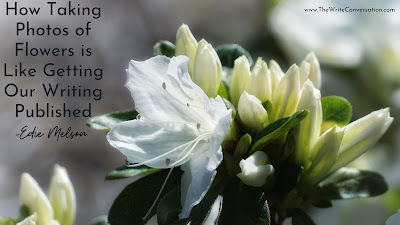
by Edie Melson @EdieMelson
This flowering bush stopped me in my tracks. I was first struck by the rich white of the blossoms. As I studied the plant, my photographer’s eye searched for just the right flower in just the right setting. It took several minutes before I chose this particular one.
It wasn’t that the other flowers weren’t as pretty, some had even more perfect shapes and petals, but they weren’t at the correct angle or had too much sun or shade. I wanted to get a picture of the entire bush, but it was too large and busy to get in one shot. The flowers showed best when I focused on just one.
All of this made me think about my publishing journey. My manuscripts are each like one of the flowers on the bush. Each publisher has to study everything they get and decide on a perfect fit for them. It’s not that there is always something wrong with the ones they don’t choose, they’re just not right for them at that place or at that time. And no publisher can publish everything well. Each one does much better when all the attention is focused on it.
This metaphor can be applied to many things in life and I for one, will try to remember this lesson the next time I face disappointment.
You did not choose me, but I chose you and appointed you that you should go and bear fruit and that your fruit should abide, so that whatever you ask the Father in my name, he may give it to you. John 15:16
TWEETABLEHow Taking Photos of Flowers is Like Getting Our Writing Published @EdieMelson (Click to Tweet)
 Edie Melson is a woman of faith with ink-stained fingers observing life through the lens of her camera. No matter whether she’s talking to writers, entrepreneurs, or readers, her first advice is always “Find your voice, live your story.” As an author, blogger, and speaker she’s encouraged and challenged audiences across the country and around the world. Her numerous books reflect her passion to help others develop the strength of their God-given gifts and apply them to their lives.Connect with her on her website, through Facebook, Twitter and on Instagram.
Edie Melson is a woman of faith with ink-stained fingers observing life through the lens of her camera. No matter whether she’s talking to writers, entrepreneurs, or readers, her first advice is always “Find your voice, live your story.” As an author, blogger, and speaker she’s encouraged and challenged audiences across the country and around the world. Her numerous books reflect her passion to help others develop the strength of their God-given gifts and apply them to their lives.Connect with her on her website, through Facebook, Twitter and on Instagram.
June 13, 2024
Get It Right—Three Reasons to Rewrite Your Work

by Lilka Raphael @Lilka_Raphael
“Good writing is essentially rewriting.” Roald Dahl
I recently attended a writers conference and one of the instructors reiterated the importance of rewriting our work. His take on the profession was an acknowledgement that writing is the art of rewriting. For those of us in the initial stages of a writing career this is especially true. The determination to complete our work does not absolve the obligation to refine our words into the emotions, imagery, or information sought after by our audience. Here are three reasons to get it right with the rewrite.
Stay RelevantLike technology, writing trends evolve. What was considered brilliant years ago may not work well today. Changes in publication guidelines may require that we revise our initial work into something preferable to editors while catering to our readers. If you have a novel tucked away for decades (like me), it probably needs some revisions to make it relevant to today’s reader. I can recall an era with adjectives and adverbs sprinkled like pixie dust to “paint the picture” in romance novels. Years later, less is more. One strong modifier is preferable to three of them. Great authors utilize other techniques to evoke a mood or describe a scene. Though dependent on genre, tight and concise writing that is readily accessible on our mobile devices has become ideal for mass media distribution.
Meet the Reader’s ExpectationsThe task of rewriting extends beyond quick edits and forces us to examine every word, phrase, and paragraph. What words clearly answer the reader’s questions? Is a concept thoroughly communicated? Are our transitions smooth and easily followed? Rewriting prompts us to delete the words that only contribute to the word count instead of engaging our audience. Our goal is to provide what the reader needs without giving them more than what is palatable. Achieving this objective is a delicate balance of addition and deletion while meeting the felt need of the reader.
Put Yourself in Your WorkThis can span the gamut of ensuring your voice permeates your words to bearing your soul and sharing firsthand experiences. I have discovered that the most engaging articles are often the ones where we allow ourselves to be vulnerable. Sharing our challenges in life provides an opportunity for readers to empathize and realize that they are not alone in their trials. Even in cyberspace, people want to connect with other people that are relatable and share common experiences. We can inadvertently diminish our voice to the point where our writing comes across as informative, yet sterile. This is daunting for introverts like me. However, the ability to inspire, teach, and entertain our readers is worth the effort and the risk.
Whatever you write, rewrite it. Then rewrite it again. Our goal is to successfully convey information or deliver an experience. Taking the time to rewrite and weigh our words against our audience not only sharpens our skills but makes the time invested by our readers well worth it.
The plans of the diligent lead surely to plenty, But those of everyone who is hasty, surely to poverty. Proverbs 21:5 NKJV
TWEETABLEGet It Right—Three Reasons to Rewrite Your Work from @Lilka_Raphael on @EdieMelson (Click to Tweet)
 A Florida native, Lilka Finley Raphael has been a licensed pharmacist for over thirty years. Her passions for writing, gardening, and photography prompted her to share her experiences and life lessons on her blogs B Is for Blessed and God, autism, & me. You can learn more about her at lilkaraphael.com
A Florida native, Lilka Finley Raphael has been a licensed pharmacist for over thirty years. Her passions for writing, gardening, and photography prompted her to share her experiences and life lessons on her blogs B Is for Blessed and God, autism, & me. You can learn more about her at lilkaraphael.comLilka’s greatest achievements are her two adult sons who have flown the nest. Happily married for thirty-two years, she lives east of Atlanta with her husband, Rod. They now share their home with two German Shepherds—Holly and Ivy—and one naughty kitty, Moxie.



